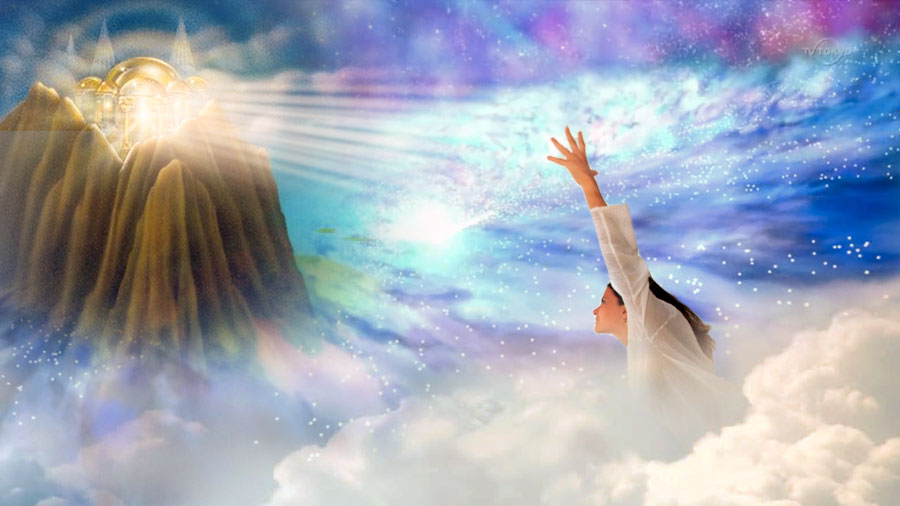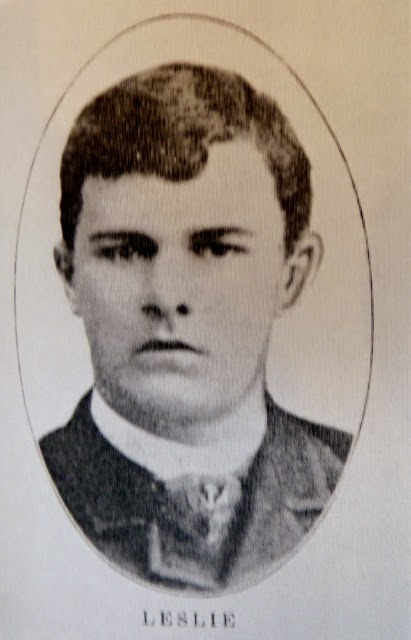Life In The Afterlife ~ Part III
 by Stafford Betty
by Stafford Betty
“From my experience I have learned that the spirit world is around us, that our spirit friends are with us every day, and that there is a tie which binds their hearts to ours so that they are with us many times and try to make us feel their presence.” ~ Alice Stringfellow
Leslie Stringfellow died in his hometown of Galveston, Texas, in 1886 after a brief illness. He was 20 years old. His father, Henry, was a prominent horticulturalist and his mother a pianist. Leslie himself was a gifted musician doted on by both parents, especially his mother, Alice. He was an only child. Alice was devastated by his death and out of desperation sought to make contact with him using a planchette. She would describe the process many years later:
“I was told to place my hand lightly on [the planchette] and await results. This I did for many days in vain until one day I suggested that my husband put the tips of his fingers on one end while I lightly placed mine on the other. The results were marvelous. Writing came, so legible and plain, and each day there were written pages and pages. Neither my husband nor myself could write without the other so we made an appointment for every evening at the same hour when our little table and planchette would be ready, with large sheets of white paper. And no one knows our joy and happiness when our boy told us … all abut his friends and companions and pastimes there. He said that he was our same boy, that he was happy to be with us and to make himself known and that my perseverance had accomplished this happiness.”
 Leslie communicated to his parents in this manner for the next 15 years, but it wasn’t until another quarter century passed, and after Sir Arthur Conan Doyle (the creator of Sherlock Holmes, and student of mediumistic literature) encouraged publication, that Alice at last decided to publish selections from Leslie’s letters. She published a mere 100 copies for distribution to family and friends. Her selections for the book were a small fraction of Leslie’s complete opus. She found countless evidential instances and had no doubt about the identity of the author.
Leslie communicated to his parents in this manner for the next 15 years, but it wasn’t until another quarter century passed, and after Sir Arthur Conan Doyle (the creator of Sherlock Holmes, and student of mediumistic literature) encouraged publication, that Alice at last decided to publish selections from Leslie’s letters. She published a mere 100 copies for distribution to family and friends. Her selections for the book were a small fraction of Leslie’s complete opus. She found countless evidential instances and had no doubt about the identity of the author.
Leslie’s Letter to His Mother was lost to the world until a librarian at the University of Arkansas, Stephen Chism, stumbled across a copy and was so intrigued by it that he undertook to bring it out in a new edition (2005) with the title The Afterlife of Leslie Stringfellow. I worked with both the original edition and Chism’s beautifully edited version.
One of the book’s most remarkable features is Leslie’s description of his world’s geographic relation to ours. In agreement with all other accounts I’ve researched, his world is physically close to our own, though in a different dimension. But Leslie is more specific than other spirit communicators. He tells us that “the spirit world begins very near the earth and extends millions of miles beyond. It surrounds yours on all sides, like the atmosphere does the globe, and every nation has its counterpart in spirit, surrounding it, in connection with that part over or nearest its earthly place of residence”. In other words, most Hindus live in the part of the spirit world that hovers over India, and most Chinese over China. And, as we’ve seen, each region extends indefinitely outward. Further, “There is a spiritual sun which shines through yours, and lights our world. Our sun shines always, but for few hours out of each 24 is not as bright, and that is our night, from about 12 pm to about 5 am”. This description tallies with our reality. Leslie’s night would be shorter than ours because, since he dwells farther out from the earth’s surface, the earth would block out the sun less completely during the spirit world’s night. A good geometer could use this information to locate Leslie’s approximate distance from the earth’s surface. As for the weather, Leslie tells us the temperature is always pleasant, as it is on a mild summer day. It never rains, but there are “gentle mists about every two weeks”. Spiritualists sometimes use the word ‘Summerland’ to describe the region where spirits neither habitually good or bad, as well as children, find themselves after death. From now on we’ll use this word for Leslie’s world.
In keeping with this designation, Summerland is enchantingly beautiful. Gorgeous trees and flowers, shady glades and rushing streams, towering mountains and sparkling lakes, striking land features and charming little villages, vast oceans with islands, and large cities – all of these are here. And there are animals, plenty of them. Leslie speaks of a vast forest set apart for wild animals where one may visit without fear of harm. He visited this place and saw “great monsters that lived thousands of years before man came”. Another part of Summerland was a kind of bird sanctuary:
“This is a part of the world for all wild water fowls that lived on earth. You cannot conceive the countless millions of ducks, geese and that class of fowls. Some flew away but many times they just swam off and seemed to watch us with great curiosity. There were low trees and on one side a vast rocky cliff on which were curious looking birds that lived on earth before men.”
Of special interest is his claim that our earth is a gestation ground for all the species of flora ad fauna that he finds in his world, and that men and women have been developing Summerland for thousands of years just as they’ve been developing earth. In other words, Summerland is not ready-made by God, but has been developed into an ever more splendid world system over the centuries by our ancestors. This claim is borne out by references to Summerland’s cities and technology which are ‘engineered’ by spirits out of astral matter. One day Leslie went with his friends
“to the Mountain of Fine Arts. It is situated many thousands of miles from here and this was the first time we had been there. The whole mountain is a grove of grand trees and at intervals on the sides are situated the most magnificent temples or halls you can conceive. One is dedicated to Music, one to Painting, one to Sculpture, one to Machinery, and other things, and on the top was a great temple of the Poets. … I spent a good part of the day in the Hall of Music and heard Mozart lecture on the ‘Theory and Science of Music’.”
Another time he watched a new drama by Shakespeare in the Hall of Poetry:
“This Hall is fitted up with a stage and is one of the most beautifully decorated buildings here. The seats are all covered with the finest damask and the ceiling is one grand fresco, painted by Michael Angelo. There were more than one hundred artists and the principal part was acted by Garrick. You know there is a universal spirit language and though all the poets and artists of different countries were there, of course they could all understand.”
But not all was art for Leslie. He tells us that one day he went to “our Atlanta – each community and country in your world has its counterpart all around it in [ours] – and met Jefferson Davis, president of the Confederacy during the Civil War”. Another time he heard Benjamin Franklin deliver a lecture on electricity. Leslie traveled widely and rewarded his curiosity every chance he had. But Socrates, he tells us was out of reach:
“Socrates is with the advanced spirits, way up in the spheres. We cannot go there, only know that it is a very lovely world. They come to us to teach and inspire, by what you would call scientific philosophy. Progression to the higher spheres depends greatly upon the desire of each person, and also upon the effort to acquire knowledge. … The higher one goes the more elevated he is in knowledge and goodness. We are satisfied in this, the second sphere [Summerland], and must stay here as long as we are satisfied.”
We should not forget that Leslie was only 20 when he died and that his interests in Summerland would have corresponded to his age. And in fact Leslie has what we would call a great deal of fun. In addition to music lessons under the spirit world’s best violinists, he traveled all over his world, sometimes walking, sometimes moving “by will-power”. He thoroughly enjoyed these trips. On one occasion he discovered “an immense lily of the Victoria Nyanza variety” in the center of a large lake near his grandmother’s home:
“It is the most enormous thing you can imagine and yet the most beautiful. The leaves float on the surface and are as large as this room, and very thick. I walked all over one leaf. In the center of the plant are seven enormous flowers, as white as snow, shaped like a morning glory, with scalloped edges. One was leaning over on its side, and I got in it, and was hidden from view.”
And Leslie went to parties. “Nothing gives us more fun than when a party of young folk get together and relate their earth experiences.” On December 20, 1889, he told his parents how he and friends planned a Christmas party for some of Summerland’s orphaned children. They planned to select a fir tree and materialize “all kinds of jewels and gifts and toys” to decorate it with. When the children arrive, “I am to hide in the tree and when all are assembled will play on my violin a Christmas piece which I composed”. On December 25 he described the festivities to his parents: “The children all stood around and sang beautiful Christmas hymns, and when all the presents were off the tree, we dematerialized it, and it melted away into a green vapor, and disappeared.”
But all is not fun and games in Summerland. Even though Leslie describes it as “a thousand times better in every way” than our world, he later admitted that his mother’s depression following his death – a depression that stretched out for eleven years – “has many times been bitterness to me”. Other spirits suffer from neglect. They want to be remembered, to be in their loved ones’ thoughts, to have even a single flower left on their gravestone. Loneliness can figure prominently in Summerland. At one point Leslie makes a plea to all of us on earth to make more use of the medium’s gift. If we did, if we kept up a running conversation with ‘the dead’, fewer of them would be so soon forgotten.
Then there is ‘the Realm of the Unprogressed,’ a euphemism for hell. There are many different levels in this realm, but we have space to view only one, a sub-world for the most debased among us. Alice occasionally received messages from others besides Leslie, and in this case it was her cousin Bettie who came through. This is how she describes the inhabitants: “They are what you would call the scum of the earth and have passed their lives in vice and crime. There is but one such place for this class, but its extent is incredible and its population immense. They live in discord and misery and everything is dark and forbidding, and a dull leaden fog pervades the air at all times.” Bettie tells Alice that she sometimes enters their world to help them out of their predicament – for no one is damned eternally by an angry God. Such visits are common: “Every good spirit who has friends there goes often to see them and makes every effort to awaken in them sorrow for their past lives and a desire for the purer and higher life.” But such efforts are usually
“a thankless task, for many of them are so wedded to their terrible life that they actually take pleasure in it, and resist every effort that is made in their behalf. But some see their error and are brought to feel the wrong of such a life, and embrace the first opportunity to escape. They have no settled occupation, but live in idleness and it is sad to think how many, by their lives on earth, are preparing a residence for themselves in this dreadful place.”
A poignant communication came to Alice on one occasion from an old school chum who had become addicted to morphine:
“My dear Alice:
“I am so unhappy over the bad life of my poor child [back on earth]. She is a slave of the awful drug that ruined me. Yes, and my heart aches for Helen’s future. I have repented but that does not save her from the consequences of my bad example.
“I have been here [in Alice’s upstairs parlor where the planchette is located] many times and it gives us great relief to be able to confess our wrongs to you. I never saw Leslie, for he is far happier than I am [and lives in a different zone of the afterworld].
Mary Martin”
It would be natural for some readers to wonder if all believers in a non-Christian religion find themselves in the Realm of the Unprogressed. Leslie tells us this is decidedly not so and shows a remarkable knowledge of non-Christian faiths for his time. You will remember that the adventurous Leslie and his friends are fond of travel. Here is what he says about the Chinese:
“The Chinese people resemble very much their earthly bodies and their faces have the same almond eyes and flat noses, and they dress for all the world like they did on earth. In fact, I believe every nation, when its people first pass over, keeps the same characteristics that marked them on earth. When spirits from any part of our world go to some other they are recognized at once as strangers and every possible attention is shown. We received any number of invitations to spend the day and were shown around by gentlemen wherever we wanted to go.”
Many a Westerner who has heard classical Chinese music will understand Leslie’s reaction to it the first time he heard it:
“Of all the hideous groaning and growling and creaking, you never heard the like. And just to show how people’s tastes differ, I looked around after the overture was concluded, and the whole crowd were in a broad grin of delight and were applauding for all they were worth.”
It’s clear from Leslie’s many visits to Summerland’s various realms that (1) no one race or religion is favored over another, and that (2) people prefer to live among others of similar background and culture, just as they do here on earth. Of Hindu India, for example, he says, “This part of the Spirit World is very exclusive and those who live here seldom go elsewhere.”
If right belief isn’t the determinant of salvation, then what is? The answer is clear from the first page: “True religion is to love God who is our father, and do all we can to make others happy.” By God, Leslie does not have in mind a purely conventional notion. He tells us “that God dwells in the trees and flowers as well as in us, and that the entire world in all its forms is but an expression of His life and power”. Without being in the least preachy, Leslie tells his mother, “I did not appreciate the beauty of an unselfish life on earth as I should have done, for oh, Mamma, there is no happiness so pure as that which flows from helping others, no matter how humble or small the favor done may be. Heaven would be on earth, if only that spirit prevailed.” People aren’t saved by their theology or by what scripture they follow. They advance themselves by their growing knowledge and their willingness to serve others in love. Faith in God is reflected everywhere in this account, but Leslie makes it clear that loving actions are the gunpowder of spiritual progress. Those actions are sometimes directed at us, with everything from a labor-saving invention to a great musical idea to a more inclusive spirituality being telepathically impressed by spirits on the most receptive and fertile minds for the good of the planet.
Nevertheless, Summerland is not a Communion of Saints. The best Summerlanders are spirits in progress, like Leslie. Many grades of progress are described, and even a spirit’s home is an “index of his character”. Great spirits are not to be found here, unless they be teachers come down for a spell from a higher sphere.
Summerland is also, as mentioned above, a place for children. And there are millions of them, most of them orphans. Leslie comes close to being an orphan himself – not because his parents have died before him, but because he has died before them. But he is already a young man, not a child. Let’s look briefly at the life of orphans in Summerland:
“There are many homes for children here, and today we visited one situated in an immense grove of trees and the buildings covered a space of ground as large as a small town.
“This was for small children under seven and eight years. Older ones have other homes, where they go after leaving these infant ones.
“The children are watched over and cared for by the most beautiful and motherly spirits who in their earth-life were especially fond of children. These are entirely orphans, as we call them, or children whose parents are still on earth, but who will take them home when they themselves come over.
“These children are educated in every branch of knowledge and those who have special tastes for music, painting and other accomplishments are given every opportunity to cultivate these talents.
“In talking to these little ones, it was easy to tell those who has had no earth-life or experience. They seemed more spiritual, but not so sympathetic and affectionate, as the others who had known a mother’s love on earth.
“Not in this whole Spirit World is there a child who would for a moment think of wishing to leave this bright and happy home, in exchange for the pains and sorrow of your world.”
On one occasion Leslie and friends attended a school outing. Sitting under trees, they delighted in telling the kids stories of earth:
“I told them all about the overflow in Galveston in 1886, when I went down and got the ducks. And about the snakes, about my boat, and the pears, and what astonished them most was that you raised pears ‘to sell’. These had not known earth-life, and here, as you know, all is gift. And when we told them money was little round pieces of metal, they could not understand why anyone wanted it, and we had to laugh at their curious questions.”
We will leave you with a thought that doesn’t fit in with anything else we’ve discussed here. Leslie tells his mother and father that he’s been “reading an old book that tells all about the earth as it was 20,000 years ago and about the lost continent of Atlantis”. He tells them that
“it extends from the Azore Islands, which are the tops of its mountains, to nearly across the Atlantic Ocean. It was a highly civilized and densely peopled country, with great cities and beautiful and fertile lands and for thousands of years was the home of the arts and sciences. … This beautiful country …suffered an earthquake in the middle of the night, and in a few moments was engulfed and lost from sight.”
This account squares with research-based theories that have surfaced recently in our own time, though, of course, no one really knows.
Excerpt from The Afterlife Unveiled: What The Dead Are Telling Us About Their World
Posted in Life On The Other Side, Other Topicswith comments disabled.





